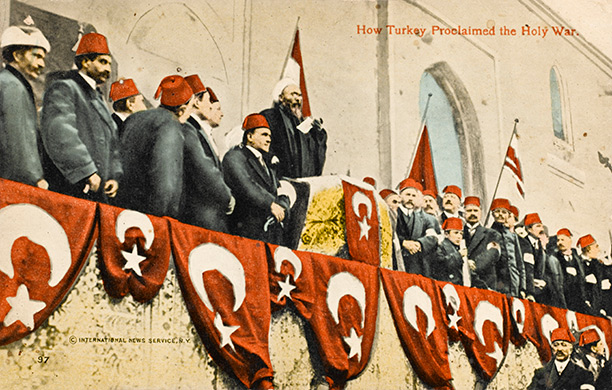Jihad 1914
In the early days of the First World War a plan was hatched in Berlin to spread revolt among the Muslim populations of the Entente empires. David Motadel looks at the reasons why it failed.
 On Wednesday November 11th, 1914, as the Ottoman generals mobilised their troops to fight on the side of the Central Powers, Shaykh al-Islam Ürgüplü Hayri, the highest religious authority of the caliphate in Constantinople, issued five fatwas, calling Muslims across the world for jihad against the Entente and promising them the status of martyr if they fell in battle. Three days later, in the name of Sultan-Caliph Mehmed V, the ‘Commander of the Faithful’, the decree was read out to a large crowd outside Constantinople’s Fatih Mosque. Afterwards, in an officially organised rally, masses with flags and banners moved through the streets of the Ottoman capital, calling for holy war. Across the Ottoman Empire, imams carried the message of jihad to believers in their Friday sermons.
On Wednesday November 11th, 1914, as the Ottoman generals mobilised their troops to fight on the side of the Central Powers, Shaykh al-Islam Ürgüplü Hayri, the highest religious authority of the caliphate in Constantinople, issued five fatwas, calling Muslims across the world for jihad against the Entente and promising them the status of martyr if they fell in battle. Three days later, in the name of Sultan-Caliph Mehmed V, the ‘Commander of the Faithful’, the decree was read out to a large crowd outside Constantinople’s Fatih Mosque. Afterwards, in an officially organised rally, masses with flags and banners moved through the streets of the Ottoman capital, calling for holy war. Across the Ottoman Empire, imams carried the message of jihad to believers in their Friday sermons.





![‘Scientific Researches! New Discoveries in Pneumaticks! [sic] or an Experimental Lecture on the Powers of Air, May 23, 1802’, by James Gillray. Minneapolis Institute of Art. Public Domain.](/sites/default/files/styles/teaser_list/public/2025-03/lecture_history_today_0.jpg?itok=mHN_obPV)